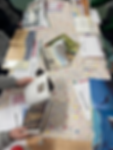Getting to grips with a 'Book Tasting'
- Clara Maria Fiorentini
- Feb 26, 2023
- 3 min read
"Reading for Pleasure is a vital part of children's development. It has been proven that the children who read everyday for pleasure, or are read to, are more successful in their lives." (Pieper, 2016)

With World Book Day fast approaching, it can be hard to avoid getting drawn into the hustle and bustle of activities and festivities designed to make reading 'seem' more exciting for children. World Book Day is a wonderful opportunity to celebrate books and reading; but it's fast becoming so commercialised, that in the race for costumes, videos and competitions, reading actual books falls further and further to the wayside.
Amidst such stand-alone celebrations, it's important to ensure that reading firmly remains the 'prize'. Intrinsic motivation will always trump extrinsic motivational factors when it comes to reading and building solid reading habits. Getting books in to children's hands matters immensely; regularly handling lots of different books, exploring different genres and finding opportunities to engage in meaningful, sustained reading of texts; especially those which the children have chosen for themselves - away from races, points, prizes and logs.
For such reasons, I am huge advocate for book tastings - for hosting them regularly and to use them as a means of offering consistent, meaningful opportunities for children to associate reading with pleasure and positivity.
What is a book tasting?

A book tasting, is exactly what it says it is. A chance to 'taste' lots of lovely literature. It's like going into a restaurant, but instead of food, it's books on the menu. Set off a solid block of time, 30mins to an hour, and invite the children to 'taste' some texts.
Out of sheer personal preference, I have always leaned towards picturebooks for book tasting. A picturebook 'buffet' affords a wonderful opportunity for children to get to 'taste' multiple texts at a time.

However, there are so many other formats a book tasting can take:
First chapter feasts
Cover walks
Poetry café
Organised by genre or book type e.g. Fairytale Feasts, Fantasy Feasts, Gourmet Graphic Novels, etc.
'Read a first chapter / first few pages / explore covers
Courses: Starters (cover & first page), Mains (full text), Dessert (back cover, dedications & reviews)
'Speed Reading' - timer, read, rotate (speed-dating style!)
Introduction to texts in class library
Introduction to texts 'coming up'
Themed texts (e.g. Sea Theme)
Collective texts (multiple copies)
Home-school links - invite the parents & guardians in!
Introduction to school library
Or... whatever model works best for your own class!
Setting the scene:
Here's a quick look at a recent book buffet of mine:
I should point out that the candles in the video are battery powered!
The most important resource is the books. You might help set the scene with some tablecloths, placemats and some task cards - that's up to you. As they read, the children might record titles they enjoyed, give star ratings or even complete mini-reviews. Playing some restaurant themed background music always works nicely too; it helps set the scene and keeps 'book blether' to a manageable level. Of course, I tend to opt for something Italian themed - books can transport you anywhere, so why not the Amalfi Coast?

My trusty, little Ikea trolley is still going strong - very useful for transportation of materials between rooms and for quick set-up / tidy-up purposes!

If a book tasting or a book buffet is something you think you would like to try, you can download a PDF containing all my Book Buffet posters, placemats and task cards below.
Happy reading!

FAQ: Are all the 'bells and whistles' necessary?
No. Ultimately, the books you offer are what matter the most, but a little scene-setting helps create the playful atmosphere, and may lure some of the more reluctant customers into the experience!
"Providing a rich variety of reading materials communicates to students that reading is a worthwhile and valuable activity and sets the stage for students to develop the reading habit." (Gambrell, 2011)
